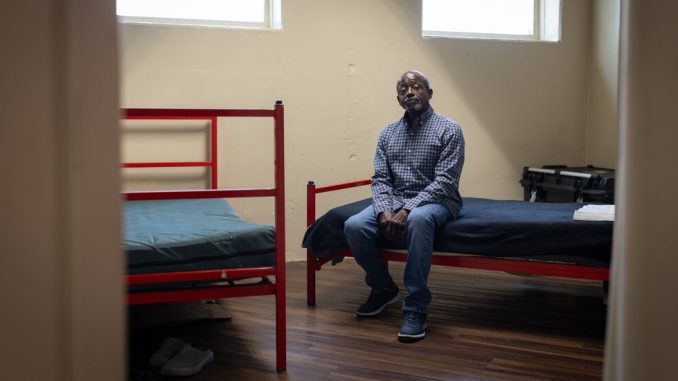
After more than 40 years of struggling with drug addiction and homelessness, Barry Dupree has a distinct memory of a milestone in his recovery: casting a ballot in the 2020 election.
“I felt like a human being, I felt like I was part of the world,” Mr. Dupree, 64, said. He had gotten sober and found shelter at Gateway Center in Fulton County. “I felt as though my word was listened to, my suggestion of who I wanted was heard.”
There are thousands of voters like Mr. Dupree across Georgia and the country, those experiencing homelessness who are able to vote with the proper identification. They receive election related-mail at shelters, relatives’ addresses, temporary locations or P.O. boxes, and the vast majority vote in person.
A single-sentence provision in a new election bill in Georgia could complicate voting for some of the state’s homeless population. The bill, which has passed both chambers of the State Legislature and is awaiting Gov. Brian Kemp’s signature, would require all election-related mail for those “homeless and without a permanent address” — such as registration cards, sample ballots and absentee ballots — to be sent to the county registrar office.
The full impact of the change is unclear. Under the bill, voters who are homeless would need to go to the county registrar’s office to see if their registration was up-to-date, to learn about a change in a polling location or request and receive an absentee ballot. Voters with a permanent residence would receive information like this at their homes.
If there were no changes or additional documentation required for their registration, they would still be able to vote in person. It was unclear whether the changes applied to people in domestic abuse shelters or other temporary housing.
For many homeless voters, an additional trip to the government office can constitute a heavy burden, voting rights groups and homeless activists say. It could create unnecessary and long travel times, taxing an already chronically poor population, and cause confusion for voters who have a low voting propensity and an even lower access to news and information.
“I think it would make it incredibly difficult for many in the homeless population, because of transportation and where those facilities might be located,” said Donald H. Whitehead Jr., the executive director for the National Coalition for the Homeless, a nonprofit group. “A lot of shelters are in rural locations with limited transportation, so if someone was needing to go to this one specific location, it is really problematic.”
State Senator Max Burns, the Republican sponsor of the bill, did not respond to requests for comment. Garrison Douglas, a spokesman for Mr. Kemp, a Republican, said that the office was still reviewing the legislation.
It’s difficult to know how many homeless people typically vote in Georgia. One estimate by Fair Fight, the voting rights organization founded by Stacey Abrams, the former Democratic state representative, there were roughly 7,500 people who had registered to vote using a homeless shelter as their address in the five biggest counties in the state. More than 1,500 of those voted in recent elections, the group found.
The 2020 presidential race in Georgia was decided by less than 12,000 votes.
The Department of Housing and Urban Development estimated that there were 582,500 people experiencing homelessness in 2022. A 2012 study by the National Coalition for the Homeless found that roughly 10 percent of registered voters who are homeless cast a ballot in that election. For comparison, 71 percent of adults over 65 voted in the 2012 election, according to the U.S. Census Bureau.
Aside from the homelessness provision, the new legislation largely focuses on election administration. It requires new voting technology and makes it easier for a voter to challenge another voter’s eligibility. Activists have criticized the bill as unnecessary and rooted in debunked theories about Democrats committing rampant voter fraud.
“It’s part of a time-honored tradition in Georgia: block the vote by any means necessary to hold onto power,” said Dr. Carol Anderson, a board member of Fair Fight Action.
Raphael Holloway, the chief executive at Gateway Center, said the organization encourages civil engagement, as part of its case management and care, “whether that’s through volunteerism, and or through civic engagement through becoming a registered voter.” He said the shelter had about 500 voters registered at its address.
William Dupree, a 70-year old Army veteran, is one of those. He became homeless in August after he, his wife and his grandchildren were priced out of their old apartment, he said. While at Gateway, Mr. Dupree has sought to stay engaged, tuning into a virtual town hall held by his congresswoman from the Gateway dormitory.
The new bill, he said, could make his civic participation harder.
“It would, it would,” he said. “Because they try to change everything, like every election, there’s a rule change. And the bigger the election, the more impact of a lot of the changes.”


Be the first to comment